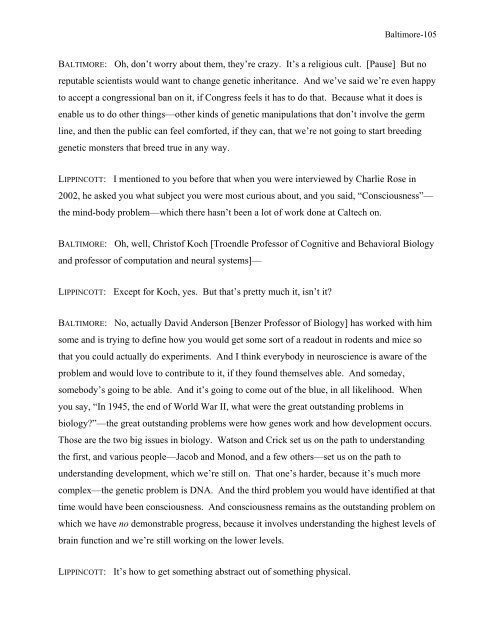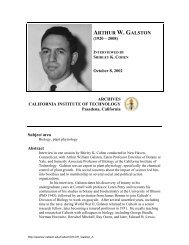Interview with David Baltimore - Caltech Oral Histories
Interview with David Baltimore - Caltech Oral Histories
Interview with David Baltimore - Caltech Oral Histories
Create successful ePaper yourself
Turn your PDF publications into a flip-book with our unique Google optimized e-Paper software.
<strong>Baltimore</strong>-105<br />
BALTIMORE: Oh, don’t worry about them, they’re crazy. It’s a religious cult. [Pause] But no<br />
reputable scientists would want to change genetic inheritance. And we’ve said we’re even happy<br />
to accept a congressional ban on it, if Congress feels it has to do that. Because what it does is<br />
enable us to do other things—other kinds of genetic manipulations that don’t involve the germ<br />
line, and then the public can feel comforted, if they can, that we’re not going to start breeding<br />
genetic monsters that breed true in any way.<br />
LIPPINCOTT: I mentioned to you before that when you were interviewed by Charlie Rose in<br />
2002, he asked you what subject you were most curious about, and you said, “Consciousness”—<br />
the mind-body problem—which there hasn’t been a lot of work done at <strong>Caltech</strong> on.<br />
BALTIMORE: Oh, well, Christof Koch [Troendle Professor of Cognitive and Behavioral Biology<br />
and professor of computation and neural systems]—<br />
LIPPINCOTT: Except for Koch, yes. But that’s pretty much it, isn’t it<br />
BALTIMORE: No, actually <strong>David</strong> Anderson [Benzer Professor of Biology] has worked <strong>with</strong> him<br />
some and is trying to define how you would get some sort of a readout in rodents and mice so<br />
that you could actually do experiments. And I think everybody in neuroscience is aware of the<br />
problem and would love to contribute to it, if they found themselves able. And someday,<br />
somebody’s going to be able. And it’s going to come out of the blue, in all likelihood. When<br />
you say, “In 1945, the end of World War II, what were the great outstanding problems in<br />
biology”—the great outstanding problems were how genes work and how development occurs.<br />
Those are the two big issues in biology. Watson and Crick set us on the path to understanding<br />
the first, and various people—Jacob and Monod, and a few others—set us on the path to<br />
understanding development, which we’re still on. That one’s harder, because it’s much more<br />
complex—the genetic problem is DNA. And the third problem you would have identified at that<br />
time would have been consciousness. And consciousness remains as the outstanding problem on<br />
which we have no demonstrable progress, because it involves understanding the highest levels of<br />
brain function and we’re still working on the lower levels.<br />
LIPPINCOTT: It’s how to get something abstract out of something physical.

















